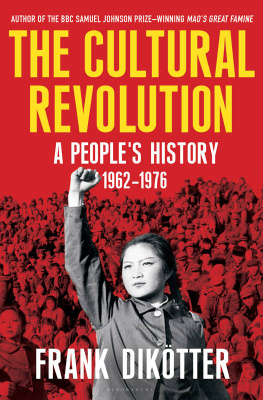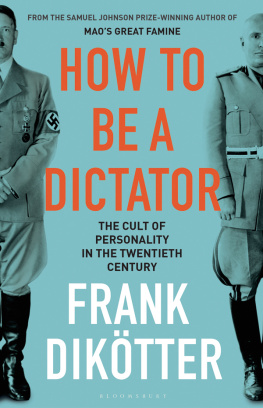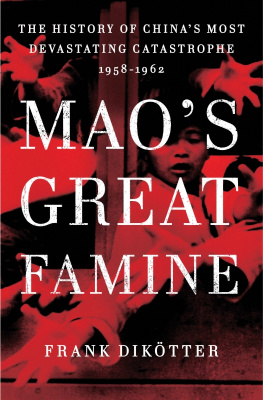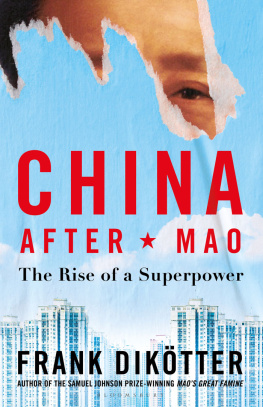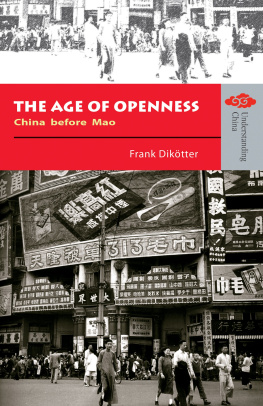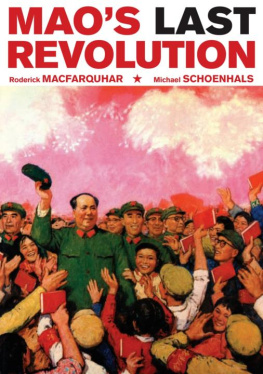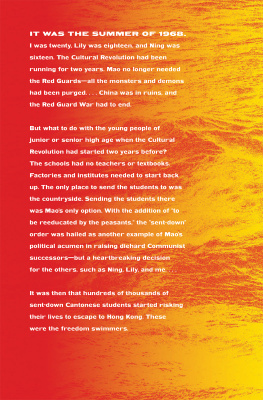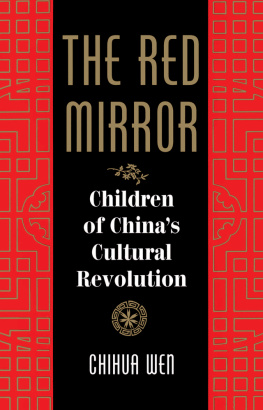THE CULTURAL REVOLUTION
THE CULTURAL REVOLUTION
A PEOPLES HISTORY, 19621976
FRANK DIKTTER

Who are our friends? Who are our enemies?
This is the main question of the revolution.
Mao Zedong
CONTENTS
In August 1963, Chairman Mao received a group of African guerrilla fighters in the State Council meeting hall, an elegant wood-panelled pavilion in the heart of the leadership compound in Beijing. One of the young visitors, a big, square-shouldered man from Southern Rhodesia, had a question. He believed that the red star shining over the Kremlin had slipped away. The Soviets, who used to help the revolutionaries, now sold weapons to their enemies. What I worry about is this, he said. Will the red star over Tiananmen Square in China go out? Will you abandon us and sell arms to our oppressors as well? Mao became pensive, puffing on his cigarette. I understand your question, he observed. It is that the USSR has turned revisionist and has betrayed the revolution. Can I guarantee to you that China wont betray the revolution? Right now I cant give you that guarantee. We are searching very hard to find the way to keep China from becoming corrupt, bureaucratic and revisionist.
Three years later, on 1 June 1966, an incendiary editorial in the Peoples Daily exhorted readers to Sweep Away All Monsters and Demons! It was the opening shot of the Cultural Revolution, urging people to denounce representatives of the bourgeoisie who were out to deceive, fool and benumb the working people in order to consolidate their reactionary state power. As if this were not enough, it soon came to light that four of the top leaders in the party had been placed under arrest, accused of plotting against the Chairman. The mayor of Beijing was among them. He had tried, under the very nose of the people, to turn the capital into a citadel of revisionism. Counter-revolutionaries had sneaked into the party, the government and the army, trying to lead the country down the road to capitalism. Now was the beginning of a new revolution in China, as the people were encouraged to stand up and flush out all those trying to transform the dictatorship of the proletariat into a dictatorship of the bourgeoisie.
Who, precisely, these counter-revolutionaries were, and how they had managed to worm their way into the party, was unclear, but the number-one representative of modern revisionism was the Soviet leader and party secretary Nikita Khrushchev. In a secret speech in 1956 that shook the socialist camp to the core, Khrushchev had demolished the reputation of his predecessor Joseph Stalin, detailing the horrors of his rule and attacking the cult of personality. Two years later, Khrushchev proposed peaceful coexistence with the West, a concept that true believers around the world, including the young guerrilla fighter from Southern Rhodesia, viewed as a betrayal of the principles of revolutionary communism.
Mao, who had modelled himself on Stalin, felt personally threatened by deStalinisation. He must have wondered how Khrushchev could have single-handedly engineered such a complete reversal of policy in the mighty Soviet Union, the first socialist country in the world. Its founder Vladimir Lenin had, after all, successfully overcome concerted attacks from foreign powers after the Bolsheviks seized power in 1917, and Stalin had survived the assault of Nazi Germany a quarter of a century later. The answer was that too little had been done to remould the way people thought. The bourgeoisie was gone, but bourgeois ideology still held sway, making it possible for a few people at the top to erode and finally subvert the entire system.
In communist parlance, after the socialist transformation of the ownership of the means of production had been completed, a new revolution was required to stamp out once and for all the remnants of bourgeois culture, from private thoughts to private markets. Just as the transition from capitalism to socialism required a revolution, the transition from socialism to communism demanded a revolution too: Mao called it the Cultural Revolution.
It was a bold project, one that aimed to eradicate all traces of the past. But behind all the theoretical justifications lay an ageing dictators determination to shore up his own standing in world history. Mao was sure of his own greatness, of which he spoke constantly, and saw himself as the leading light of communism. It was not all hubris. The Chairman had led a quarter of humanity to liberation, and had then succeeded in fighting the imperialist camp to a standstill during the Korean War.
The Chairmans first attempt to steal the Soviet Unions thunder was the Great Leap Forward in 1958, when people in the countryside were herded into giant collectives called peoples communes. By substituting labour for capital and harnessing the vast potential of the masses, he thought that he could catapult his country past its competitors. Mao was convinced that he had found the golden bridge to communism, making him the messiah leading humanity to a world of plenty for all. But the Great Leap Forward was a disastrous experiment which cost the lives of tens of millions of people.
The Cultural Revolution was Maos second attempt to become the historical pivot around which the socialist universe revolved. Lenin had carried out the Great October Socialist Revolution, setting a precedent for the proletariat of the whole world. But modern revisionists like Khrushchev had usurped the leadership of the party, leading the Soviet Union back on the road of capitalist restoration. The Great Proletarian Cultural Revolution was the second stage in the history of the international communist movement, safeguarding the dictatorship of the proletariat against revisionism. The foundation piles of the communist future were being driven in China, as the Chairman guided the oppressed and downtrodden people of the world towards freedom. Mao was the one who inherited, defended and developed Marxism-Leninism into a new stage, that of Marxism-Leninism-Mao Zedong Thought.
Like many dictators, Mao combined grandiose ideas about his own historical destiny with an extraordinary capacity for malice. He was easily offended and resentful, with a long memory for grievances. Insensitive to human loss, he nonchalantly handed down killing quotas in the many campaigns that were designed to cow the population. As he became older, he increasingly turned on his colleagues and subordinates, some of them longstanding comrades-in-arms, subjecting them to public humiliation, imprisonment and torture. The Cultural Revolution, then, was also about an old man settling personal scores at the end of his life. These two aspects of the Cultural Revolution the vision of a socialist world free of revisionism, the sordid, vengeful plotting against real and imaginary enemies were not mutually exclusive. Mao saw no distinction between himself and the revolution. He was the revolution. An inkling of dissatisfaction with his authority was a direct threat to the dictatorship of the proletariat.
And there were many challenges to his position. In 1956, some of the Chairmans closest allies had used Khrushchevs secret speech to delete all references to Mao Zedong Thought from the constitution and criticise the cult of personality. Mao was seething, yet had little choice but to acquiesce. The biggest setback, however, came in the wake of the Great Leap Forward, a catastrophe on an unprecedented scale directly caused by his own obstinate policies. Mao was hardly paranoid in believing that many of his colleagues wanted him to step down, holding him responsible for the mass starvation of ordinary people. Plenty of rumours were circulating, accusing him of being deluded, innumerate and dangerous. His entire legacy was in jeopardy. The Chairman feared that he would meet the same fate as Stalin, denounced after his death. Who would become Chinas Khrushchev?
Next page
